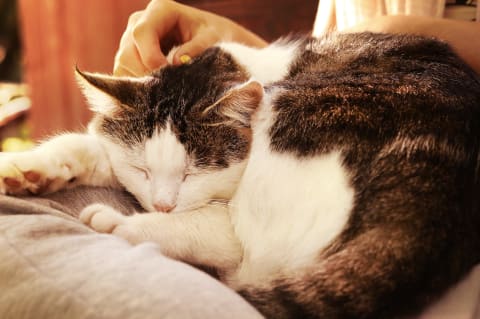What is cat diabetes?
Diabetes mellitus is the clinical name for cat diabetes, a chronic disease that stems from the inability to produce or effectively use insulin - the hormone the pancreas creates to control the flow of glucose (blood sugar) to the body’s cells. The rest of the body would then receive the energy produced.
However, if the pancreas doesn’t produce enough insulin, the cells in your cat’s body won’t receive the glucose that’s so essential. Instead, your cat’s body will feed on protein cells and fat for energy, while glucose remains unused in the bloodstream. Eventually, it will accumulate.
Types of Cat Diabetes
Similar to humans, cats can get 2 types of diabetes.
Type I (insulin-dependent)
The cat’s body does not produce or release enough insulin to send to the body’s cells.
Type II (insulin-dependent)
While sufficient insulin may be produced, the body’s tissues or organs resist it and require more insulin than a healthy cat’s body would need to properly produce glucose. Type II diabetes is most often found in obese male cats 8 years of age and older.
Those with a diet high in carbohydrates are also at higher risk. Since their bodies are unable to use the fuel in their food, their appetite may be insatiable.
Signs & Symptoms of Cat Diabetes
Instead of properly using glucose, a diabetic cat’s body breaks down fat and protein - so even cats who have a normal, healthy appetite and eat on a regular schedule will lose weight. If not treated, cats with diabetes can experience other health complications or symptoms, including:
- Increased urination
- Unhealthy coat and skin
- Lethargy or weakness
- Dehydration
- Increased thirst
- Bacterial infections
- Diarrhea or vomiting
- Liver disease
Subtle Signs
- Walking flat on the backs of their hind legs (as a result of nerve damage)
- Decrease in physical activity (uninterested in or unable to jump)
What are my treatment options if my cat has diabetes?
Though there is no cure for cat diabetes yet, treatment typically involves getting an official diagnosis carefully managing the condition with daily insulin injections. Ask if your veterinarian can train you to provide these at home.
You may need to change your four-legged friend’s diet to make sure they’re receiving the proper combination of protein, carbohydrates and fiber. They may also benefit from a prescription food formulated especially for diabetic cats.
What can I do?
Though you and your vet must closely monitor the disease, your furry friend can still enjoy quality of life if they’ve been diagnosed with cat diabetes.
Along with the daily insulin injections, your regular checkups will give your vet the opportunity to monitor your cat’s blood sugar and his response to treatment. You might also ask if their glucose can be tested at home. You should also closely track appetite and litter box use.
Your senior pet’s annual exam will be more critical than ever so your vet will be able to spot any emerging health issues, then diagnose and treat them. This is especially important as issues that are detected early can often be treated more effectively.
If you think your cat is exhibiting symptoms of cat diabetes, schedule an appointment with our veterinarians today.
Do you suspect your cat may have diabetes? Our veterinarians can diagnose diseases and conditions, and plan treatments. Contact Us today.

Looking for a vet in Asheville?
We're always accepting new patients, so contact our veterinary hospital today to book your pet's first appointment.Related Articles View All
Your Guide to Cat Rabies Symptoms & Prevention
Rabies is not only fatal for cats, it can be passed from our feline friends to us! In today's post, you will learn how rabies is spread, what makes it so deadly, what symptoms to look for, and how rabies in cats can be prevented.
Tooth Resorption in Cats
Is your cat reluctant to eat, drooling or showing other unusual behaviors? If so, it could be due to painful tooth resorption. Our North Asheville vets explain the signs to watch for and how tooth resorption can be treated.
Inflammatory Bowel Disease in Dogs, Life Expectancy
At Animal Hospital of North Asheville our vets often treat dogs with inflammatory bowel disease (IBD), and while there is no cure for this condition, in many cases IBD can be managed successfully. Here we look at the prognosis for dogs suffering from IBD.
What is hip dysplasia in dogs? How is it treated?
Hip dysplasia is a condition characterized by the abnormal formation of one or both your dog's hips leading to pain when exercising or changing position. Here our North Asheville vets explain more about hip dysplasia, its symptoms and the surgeries used to treat this condition.
